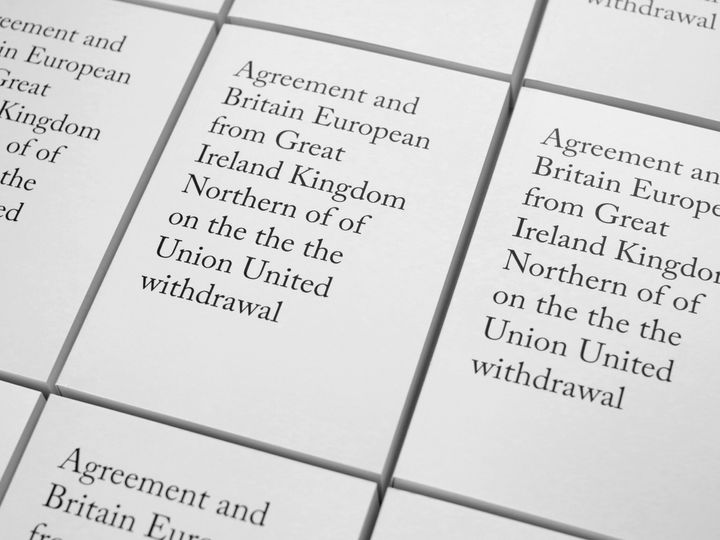
AGREEMENT AND BRITAIN EUROPEAN FROM GREAT IRELAND KINGDOM NORTHERN OF OF ON THE THE THE UNION UNITED WITHDRAWAL The final Brexit Agreement reorganised in alphabetical order. Paperback / digital download. 414 pages, 160 x 230mm.
Using technology to convert texts into datasets, provides a completely new and unique understanding of some of the most important books of our time.
Few books have caused as much controversy and division as the Brexit Withdrawal Agreement. The vote for Britain to leave or remain in the EU was decided on June 23rd 2016, with 51.9% of voters in favour of Leaving. It took almost five years to agree on the exact wording of the final text, which was signed by all parties on the 24th of January 2020.
To mark the anniversary of its signing, we reorganised the entire Brexit Withdrawal Agreement in alphabetical order. Reprogrammed like this, it still retains all its original data, but we remove any persuasive power the actual language may hold over the reader. As such we can study the text as data - objectively and quantifiably, in a way that would not otherwise be possible.
This is the third book in a series of seminal texts that have been transformed into datasets. Reorganising the entire Brexit document into alphabetical order reveals the text in an entirely new light. As a dataset, the actual Brexit agreement itself becomes something quantifiable and statistical that can shed new light on its content. By analysing this data, we can see what words and topics feature more or less prominently than we might assume if we simply read the text in a conventional way. And the findings are fascinating:
If you were to look at the actual Brexit Withdrawal Agreement as a dataset, it would paint a very different picture to the referendum result. Despite its 182,104 word count, there is little mention of many of the main issues that swayed the British population to vote for Brexit. “Independence” appears only 3 times. “Immigration” only once, “Extremism” only once. “Borders” is used 6 times, “Freedoms” 5 times, and “Sovereignty” just 3 times. Even the word “British” only makes 4 appearances in the entire agreement.
As many predicted would happen in real life, much of the data appears to point towards negative trends. “Importation” appears 45 times and “Exportation” just 21. “Short-term” appears 28 times whereas “Long-term” just 12. “End” appears 79 times, “Begin” just 3. There are 8 “Losses” to only 1 “Gain”, 20 uses of the word “Negative” to 8 “Positive” and 32 “Failure” to zero “Success”.
That said, there are plenty of positive sides to the data, with “Good” appearing 80 times and “Bad” only twice. “Peace” outnumbers “War” by 6 instances to 2. The “Future” appears 22 times, the “Past” only once, and there are 17 “Quality” to 8 “Quantity”. “Cooperation” is mentioned 350 times. There are 27 “Opportunities”, 27 “Guarantees” and 98 “Agreements”, with 2,218 “For” to 88 of “Against”.
But the data does suggest the agreement is fraught with red tape and bureaucracy. There are 153 “Consultations”, 149 “Regulations” and 28 “Restrictions”. 265 “Procedures” and 174 “Requirements”. 37 “Committees”, 74 “Objectives”, 169 “Obligations”, and 637 “Measures” with 210 “Rules”.
There also appears to be a lot of “Business”, with the word appearing 90 times. The “Economy” features just 9 times, but “Financial” appears 157 times, “Trade” 467 times, “Investment” 94 times, and “Tax” 55 times. “Money” itself appears 24 times. On the flip side, “Fraud” appears 23 times, “Laundering” 22 times, and “Criminal” 128 times, whereas ”Justice” appears 13 times, and in all this there are only 4 “Victims”.
There are 5 mentions of “Employers”, 9 “Employees”, 13 “Workers”, 12 “Visas” and just 1 single “Job”. “Rights” are mentioned 226 times, but “Authority” is over double that at 505 times. “Welfare” appears 14 times.
Despite only having 14 “Facts”, the agreement does contain 674 instances of “Information”, and 506 instances of “Data”. Other than that, “Technology” features modestly, just 8 times with the “Internet" faring a little better at 14 times.
The environment also makes a modest appearance in the document. Despite the word “Climate” appearing 48 times, terms like “Sustainability” appear just 5 times and “Pollution” only 3. “Carbon” appears 10 times, “Emissions” 9 times, “Biodiversity” 3 times, and “Biofuels” once.
It doesn’t appear to be much different for diversity and inclusion. “Gender” gets just a single mention. “Discrimination” features 14 times, with 20 mentions of “Foreign”. And despite being penned in the midst of the Black Lives Matter movement, “Equality” and “Racism” are each mentioned only once in the entire 181 page document.
In total there are 17 instances of “Remain” compared to only 4 instances of the word “Leave” - and it is probably worth noting that there are only 3 “Lies” in the entire document. Some will take solace from these findings. Others will denounce them as propaganda. But this is what the data says. And everyone knows the data never lies.

















